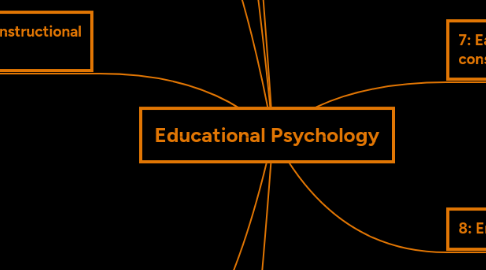
1. 1: Early August: Planning for the Upcoming School Year
1.1. Reflective Practise
1.2. Understanding the central topics that constitute educational psychology
1.3. Steps involved in the research process
1.4. Different methods used in educational psychology research
1.5. Curricular planning
1.6. Constructing a coherent approach to teaching
1.7. Using research to explain educational phenomena
2. 2: Late August : Developmental Differences
2.1. 5 guiding principles
2.2. Piaget's 4 stages of cognitive development
2.2.1. Characterized by the level of thinking and constructions created in each stage
2.3. Vygotsky
2.3.1. zone of proximal development
2.3.2. Scaffolding
2.4. Erikson
2.5. Broffenbrenner
3. 7: Early February: Socio-cultural considerations
3.1. Planning for diverse learners improves success
3.2. Understand the cognitive, behavioural, affective and motivational abilities and capabilities of students so that teachers can best meet their learning needs
3.3. Teachers need to know how to incorporate the cultures, experiences and needs of culturally and ethnically diverse students into their teaching
4. 8: End of School Year
4.1. Standardized Testing
4.1.1. Analyze students abilities and set performance standards
4.1.2. Also can be exit of high school or entry to higher education standardized tests
4.2. Achievement tests
4.3. Aptitude tests
5. 3: First Week: Establishing a Positive Learning Environment
5.1. Classroom Management
5.1.1. Evertson and Weinstein
5.1.1.1. Develop caring, supportive reltaionships with students
5.1.1.2. Organize and implement instruction in such a way that optimize students access to learning
5.1.1.3. Use group management techniques that encourage students' engagement in academic tasks
5.1.1.4. Promote the developmwent of students social skills and self-regulation
5.1.1.5. Use appropriate intervention to assist students with behaviour problems
5.2. Deci's research: strategies to nurture three fundamental student needs
5.3. Teacher behaviours
6. 4: Mid-September: Making Instructional Decisions
6.1. Diagnostic Assessment
6.2. Learning Objectives
6.2.1. Backwards design
6.3. Blooms Taxonomy
6.4. Stiggs Targets
6.4.1. DI
6.5. Problem solving and inquiry based learning
7. 5: Late September: Asssessing Student Progress
7.1. Assessment of student learning
7.1.1. Diagnostic
7.1.2. Formative
7.1.2.1. Teacher must have a deep understnainf of formative assessment practises and scaffolding
7.1.2.2. Student must have multiple ways of completing assessment
7.1.2.3. Student progress should be jduged in relation to performance expectations
7.1.2.4. Students mucst have a clear understanding of criteria
7.1.2.5. Teacher feedback from assessment must occur strategically
7.1.2.6. Feedback most effective when it focuses on qwualities of work
7.1.2.7. Effective feedback answers what is the key error and reasons for error
7.1.3. Summative
7.1.4. Backwards design
7.1.5. Table of specificaiotns
8. 6: Intellectual Differences - Intellectual Abilities and Challenges
8.1. The ability to learn from experience and the ability to adapt to one's environment
8.2. General Intelligence
8.2.1. Fluid intelligence
8.2.2. Crystallized Intelligence
8.2.3. General memory and learning
8.2.4. Broad visual perspective
8.2.5. Broad auditory perception
8.2.6. Broad retrieval capacity
8.2.7. Broad cognitive speediness
8.2.8. Processing speed (decision speed)
8.3. Types
8.3.1. Linguistic
8.3.2. Logical/Mathematical
8.3.3. Spatial
8.3.4. Musical
8.3.5. Bodily/Kinesthetic
8.3.6. Interpersonal
8.3.7. Naturalist
8.4. Intellectual ability drives learning processes; the experiential/environmental aspects of intellectual ability can be improved through learning.
8.4.1. An IEP is helped a tonne by accommodating different types of learners
